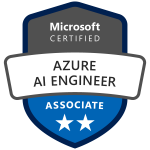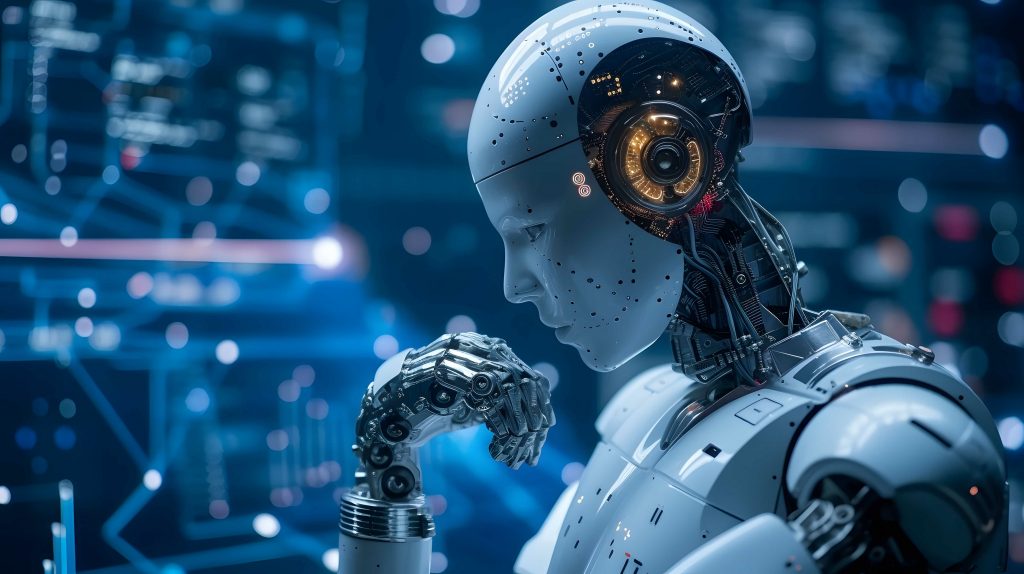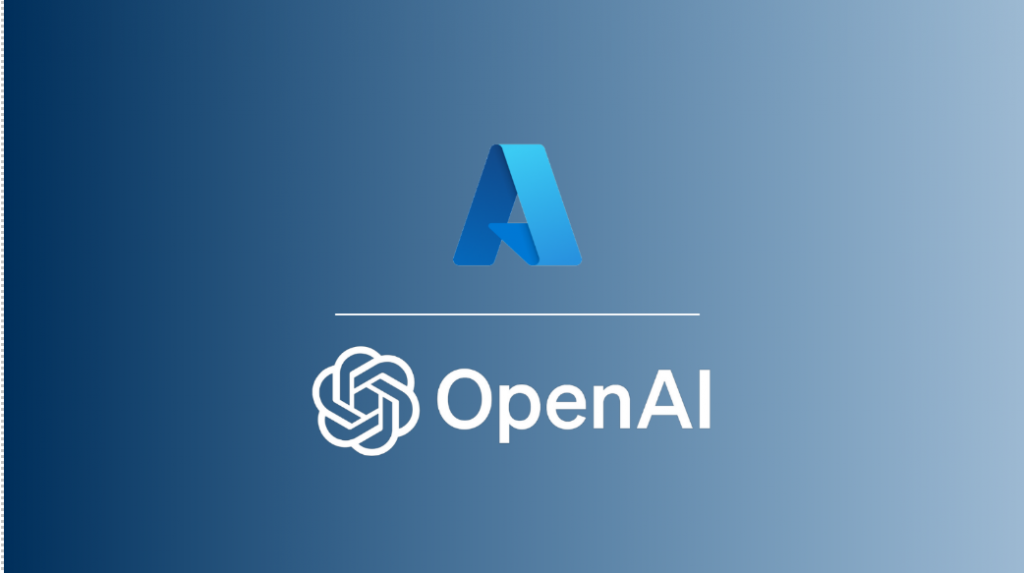Artificial intelligence (AI) Engineer
Artificial Intelligence (AI) Engineers are sought after in sectors like IT, finance, healthcare, telecommunications, banking, oil & gas, and more, for their skills in developing and training AI algorithms to perform cognitive functions. This role, demanding a blend of expertise in software development, data science, and engineering, offers a promising career with progression opportunities to positions such as AI Architect or CTO in AI-centric firms. As AI continues to evolve, new job roles and opportunities are expected to emerge, offering a dynamic career path.
Career Accelerator Program
This training program offers a thorough pathway that begins with basic concepts and progresses to advanced skills in Azure AI. It is designed to effectively prepare participants to build, manage, and deploy AI solutions using Azure AI Services, Azure Bot Service, Azure Machine Learning and OpenAI Services. Additionally, the program aims to prepare participants for successful certification as Azure AI Engineer Associates.
The program is designed to cover all necessary aspects of the Azure AI Engineer Associate role, preparing participants not only for the certification but also for practical, real-world challenges in AI roles.
Introduction to Azure and AI Services: This stage provides an overview of Azure’s fundamental services and AI capabilities, setting a foundation for the rest of the program.
Deep Dive into Azure Machine Learning: Participants will gain hands-on experience with Azure Machine Learning, focusing on setting up workspaces, managing experiments, and deploying models.
Mastering Azure Cognitive Services: This phase covers the integration of various AI capabilities using Azure Cognitive Services, with practical projects involving vision, speech, and language services.
Developing Intelligent Bots: Learners will design and deploy intelligent bots using Azure Bot Service, enhancing their functionality with integrated AI and OpenAI services.
AI Solutions and Case Studies: This stage applies the skills learned to real-world scenarios, emphasizing the practical application of Azure AI and OpenAI technologies through group projects and case studies.
Capstone Project: The final stage where participants demonstrate their comprehensive understanding of Azure AI and OpenAI capabilities by planning, implementing, and presenting an end-to-end AI solution.
Organizations are quickly embracing a skills-based approach as they seek to find the ideal individuals with the necessary skills exactly when needed.
Develop stage focuses on a mix of theoretical knowledge, practical application, and continuous improvement, to effectively prepare Azure AI Engineer Associates to be productive and innovative in their roles.
The program is built around core competencies and real-world application:
- Focusing on practical abilities and competencies needed to implement artificial intelligence technologies in real-world scenarios.
- Concentrating efforts on helping candidate master a skill set that addresses a critical business problem or challenge faced by organizations.
A Structured Approach:
- Foundation Building: Start with essential training on Azure fundamentals, AI and OpenAI services, and necessary programming skills to ensure all participants have a solid base to build upon.
- Deep Dives: Provide in-depth training sessions focused on specific Azure AI and OpenAI services like Machine Learning, Cognitive Services, and Bot Service, allowing for specialized knowledge development.
- Project-Based Learning: Engage participants with real-world projects that simulate actual work challenges to apply their skills in practical settings, culminating in a comprehensive capstone project.
- Soft Skills Development: Enhance soft skills such as communication and problem-solving, crucial for effective teamwork and interaction with stakeholders.
- Mentorship and Peer Learning: Facilitate learning through mentorship from experienced professionals and peer learning groups, encouraging collaboration and deeper understanding.
- Certification and Continuous Learning: Prepare participants for Azure AI certification and promote ongoing learning to keep up with the latest developments and technologies.
- Feedback and Iteration: Implement feedback mechanisms to continually refine the program based on participant and mentor inputs, ensuring the training remains effective and relevant.
- Tooling and Resources: Provide necessary resources such as access to Azure tools and a learning management system to support the training process and track progress.
 AI Professional Certification Program offers AI Practitioners the ability to earn credentials to demonstrate their expertise. It is designed to validate the practitioner’s industrial skills and capability to perform role-related tasks and activities at a specified level of competence. The achievement of Professional Certification demonstrates to potential employers your expertise in the AI technologies and solutions. We focus on the following world leading technologies and industry-recognized certifications that practitioner would need to accelerate their Careers after after the program.
AI Professional Certification Program offers AI Practitioners the ability to earn credentials to demonstrate their expertise. It is designed to validate the practitioner’s industrial skills and capability to perform role-related tasks and activities at a specified level of competence. The achievement of Professional Certification demonstrates to potential employers your expertise in the AI technologies and solutions. We focus on the following world leading technologies and industry-recognized certifications that practitioner would need to accelerate their Careers after after the program.
Microsoft Certified: Azure AI Engineer Associate – Design and implement an Azure AI solution using Azure AI services, Azure AI Search, and Azure Open AI.
- Plan and manage an Azure AI solution.
- Implement decision support solutions.
- Implement computer vision solutions.
- Implement natural language processing solutions.
- Implement knowledge mining and document intelligence solutions.
- Implement generative AI solutions.
An AI Engineer Associate typically engages in a variety of roles and
responsibilities that are foundational to the development and
implementation of artificial intelligence systems. For an AI Engineer Associate aiming to advance their career, several paths are typically considered, depending on their interests, skills, and the industry trends. Here are some common career targets:
- Senior AI Engineer: This is a natural progression where an Associate advances to handle more complex projects and possibly lead a small team. They would dive deeper into algorithm development, data analysis, and system design.
- Machine Learning Engineer: Focusing on the design and implementation of machine learning models, this role involves working closely with data pipelines and learning algorithms to create systems that can learn and make decisions.
- Data Scientist: Transitioning to data science might appeal to those interested in extracting insights from large data sets and using those insights to influence business strategies. This role often involves statistical analysis, predictive modeling, and data visualization.
- Research Scientist: For those with a strong academic bent or interest in innovation, moving towards research—either in academia or within corporate research labs—can be appealing. This role focuses on developing new methodologies or technologies in AI.
- AI Product Manager: If interested in the intersection of technology and business, an AI Engineer might move into a product management role, focusing on the development and lifecycle management of AI-driven products.
- AI Consultant: Leveraging technical skills in AI to advise businesses on how to implement AI solutions effectively. This role often involves understanding business needs, designing AI strategies, and helping with the integration of AI technologies.
- AI Specialist Roles: Specializing further in areas like Natural Language Processing (NLP), Computer Vision, Robotics, or another sub-field of AI depending on where the Associate’s interests and the market opportunities lie





